This Special Issue of the Journal of World History invites article manuscripts that address any aspect related to the global, transnational, and cross-cultural histories of automobilization, automobilism, anti-automobilism, de-pedestrianization, and re-pedestrianization. Continue reading “Call for Papers: Global Automobilization, Journal of World History”
Tag: Call For Papers
Call for Papers: Rapa Nui Journal
Edited by Dr. Mara A. Mulrooney, Director of Cultural Resources, Bishop Museum
The Rapa Nui Journal (RNJ) is the official, peer-reviewed journal, of the Easter Island Foundation (EIF). The journal serves as a forum for interdisciplinary scholarship in the humanities and social sciences on Easter Island and the Eastern Polynesian region. Each issue may include Research Articles, Research Reports, Commentaries or Dialogues, Book or Media Reviews and EIF News.
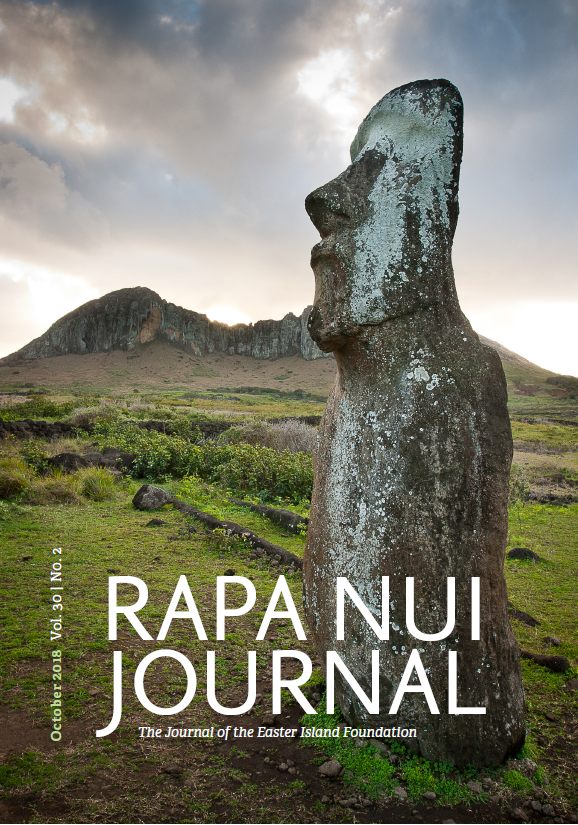
© Stephen, Jesse W. (2005, July 28). The Traveling Moai [At Tongariki near Rano Raraku, Rapa Nui].
File Format and Manuscript structure
Article manuscripts are peer-reviewed, and should be 3000 to 9000 words in length. Reports, Reviews and commentaries are not peer-reviewed, and should be 1000 to 6000 words in length.
Manuscripts should be double-spaced with margins of at least 1 inch (2.5 cm) on each side, and submitted as a single Microsoft Word (or similar) file with the following structure:
- Article title
- Author’s name(s) and contact details for publication
- Abstract
- Keywords 3-6
- Text
- Acknowledgements
- References
- Figures with captions
- Tables with captions
Manuscripts should be submitted online. You may review journal policies and author guidelines on the journal submission site.
Please send inquiries to the Rapa Nui Journal editor at (rapanuijournal@gmail.com).
Subscribe to Rapa Nui Journal through UH Press or browse full-text issues online .
Call for Papers: Biography special issue
Biography: An Interdisciplinary Quarterly seeks papers for an upcoming special issue tentatively titled, Biographic Mediation: The Uses of Disclosure in Bureaucracy and Politics.
The issue will be guest edited by Ebony Coletu of Pennsylvania State University.
From the submissions prompt by the Center for Biographical Research:
While personal storytelling in public advocacy has long been a strategy for social movements, biographic mediation emphasizes the interactive dynamics between public disclosure and administrative decision-making. This issue addresses multi-level demands for biographic mediation in contests over public policy, employment, and educational access to explore how disclosure has the capacity to reshape identity or to refocus engagement with policy consequences. Contributors may consider how personal disclosure shapes public debates, when self-narrative is restructured according to political opportunity, and how telling the stories of others becomes a standard mode of political argument.
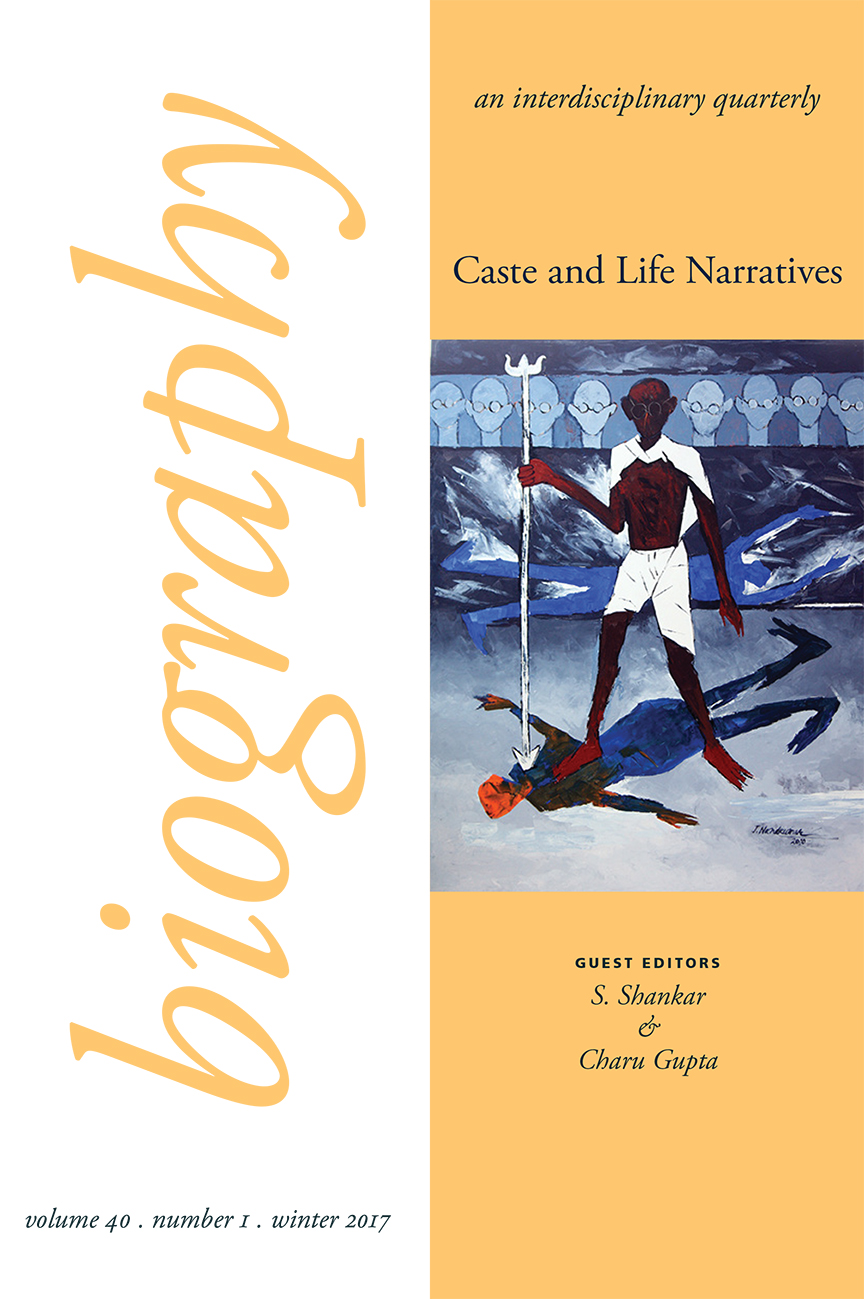
Abstracts of 350-400 words are due by December 1, 2017 for consideration. Click here for the complete submission guidelines. Authors of manuscripts selected for publication may also be invited to present on their papers at the University of Hawai’i in August 2018.
Subscribe to Biography through UH Press or browse full-text issues online via Project MUSE.
Call for Papers: Cross-Currents
The editorial board of Cross-Currents: East Asian History and Culture Review—a joint project of the Research Institute of Korean Studies (RIKS) at Korea University and the Institute of East Asian Studies (IEAS) at the University of California, Berkeley—is currently accepting submissions of research articles, as well as proposals for special issues and photo essays.
Cross-Currents is a peer-reviewed, open-access, quarterly online and semi-annual print journal that offers its readers up-to-date research findings, emerging trends, and cutting-edge perspectives concerning East Asian history and culture from scholars in both English-speaking and Asian language-speaking academic communities.
The journal seeks to balance issues traditionally addressed by Western humanities and social science journals with issues of immediate concern to scholars in China, Japan, Korea, and Vietnam. This English-language journal includes scholarship on material from the 16th century to the present day that has significant implications for current models of understanding East Asian history and culture.
Embedded in a web-based platform with functions for collaboration, discussion, and an innovative publishing process, the e-journal uses new technologies to facilitate a dialogue among East Asia scholars around the world that is enhanced by audio-visual and multilingual capabilities. The semi-annual print issues of Cross-Currents (available through University of Hawai‘i Press and Project MUSE) feature research articles from the e-journal (the journal of record for indexing and citation purposes).
Complete information on how to prepare and submit articles and proposals may be found online here.
Cross-Currents is indexed in the Emerging Sources Citation Index (ESCI), Scopus, the Bibliography of Asian Studies, the Directory of Open Access Journals (DOAJ), and Project MUSE. The e-journal operates under a Creative Commons Attribution-NonCommerical-NoDerivs 3.0 United States License.
Please email inquiries to the Managing Editor at crosscurrents@berkeley.edu.
 About the Journal
About the Journal
Cross-Currents: East Asian History and Culture Review offers its readers up-to-date research findings, emerging trends, and cutting-edge perspectives on material from the sixteenth century to the present day that have significant implications for current models of understanding East Asian history and culture. Its semiannual print issues feature peer-reviewed content from the online version of the journal.
Subscriptions
Individual and institutional subscriptions are available through UH Press.
Call for Papers: Palapala

Palapala: a journal for Hawaiian language and literature seeks papers for forthcoming volumes. Read the complete call for papers from the editors below:
Aloha Kākou!
Palapala is Hawaiʻi’s first academic, peer-reviewed journal dedicated to the study of and literature produced in ʻŌlelo Hawaiʻi. Following the online release of our first volume, we are eager to call for new submissions for future annual editions. Our first volume can be accessed online for free through the following link: Palapala Vol. 1
Palapala journal comes to us at a time when despite a growing number of speakers and academic work being produced in Hawaiian, there are few avenues through which scholars can share their research within a centralized, peer-reviewed archive dedicated to their language of study. Though Hawaiian is one of the most well-preserved indigenous languages in the world today, few outside of Hawaiʻi think to give it the scholarly attention it deserves, and there is still much archival information left for us to discover. It is our hope that Palapala will create a shift in this trend, and help bring Hawaiian and Hawaiian literature back to the forefront of scholarship, particularly in Hawaiʻi schools, but also throughout the academic world. Those eager to study Hawaiian language and culture should have more access to academically-credible, peer-reviewed works, which Palapala hopes to produce and provide for the community of scholars interested in na mea Hawaiʻi. It is our ambition that with this journal, we can continue to expand our knowledge of ancestral Hawaiʻi, and share that ʻike with the global community.
Palapala currently solicits three types of contributions:
- New research on Hawaiian language and literature.
- Book reviews on significant new books as well as books that have been widely used as references for people working in Hawaiian.
- Important reprints of newspaper and journal articles that continue to be important for new research, whether from the Hawaiian language newspapers or from other sources that are now difficult to access.
Palapala prints articles in Hawaiian, English, and, if we can find peer reviewers, other languages. Anyone interested in contributing as an author or peer-reviewer may address an email to the editors at palapala@hawaii.edu. Please note that the annual deadline for submissions is September 1.
In honor of the many kupuna who strove to preserve Hawaiian language during its time of adversary, we look forward to embarking on this important voyage towards a better future for ʻŌlelo Hawaiʻi.
Submission guidelines: Submissions (research articles and reviews) must be original works not scheduled for publication by another publisher or original work for which the contributor has received all necessary permissions to republish as open access. Reprints of important articles may also be submitted. Please send proposals or full-length articles for consideration to the editors at palapala@hawaii.edu.
Manuscripts must be provided in Word doc format with all images and tables extracted as separate files. Please format all manuscript notes as endnotes and refer to the 16th edition of The Chicago Manual of Style for citations and style guidelines. Please see the University of Hawai‘i Press Manuscript Guidelines for more details.
Upon acceptance, contributors will be asked to sign a publication agreement with University of Hawai‘i Press, and all content in Palapala is published under a Creative Commons Attribution-NonCommercial-NoDerivatives 4.0 International License.
Call for Papers: Biography special issue
Biography: An Interdisciplinary Quarterly seeks papers for an upcoming special issue tentatively titled, Political Biographies in Literature and Cinema.
From the editors at the Center for Biographical Research:
To what extent do biographies promote or question the biographee’s political values? What are the limitations of prevailing assumptions (popular and/or academic) about biography’s relationship with history? What models of the political subject do biographies of political figures presuppose, and with what consequences? Articles of general relevance, as well as specific case studies of print or film biographies, are welcome in this special number of Biography, An Interdisciplinary Quarterly on political biographies in literature and cinema.
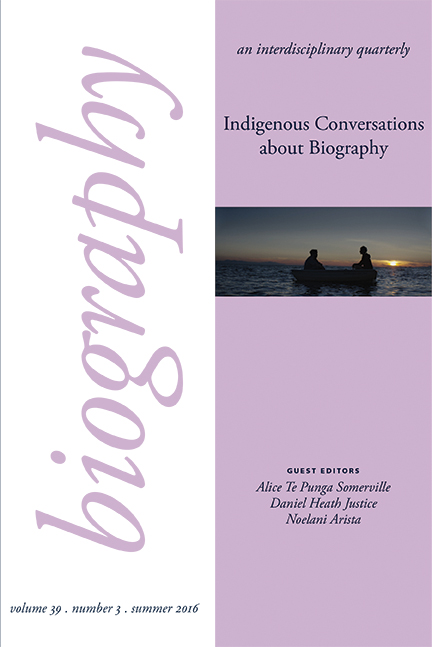 Abstracts of 250-500 words for projected manuscripts of 6,000-8,000 words may be submitted electronically by April 15, 2017. Click here for complete submission guidelines.
Abstracts of 250-500 words for projected manuscripts of 6,000-8,000 words may be submitted electronically by April 15, 2017. Click here for complete submission guidelines.
Subscribe to Biography through UH Press or browse full-text issues online via Project MUSE.
Call for Papers: Journal of World History
Call for Papers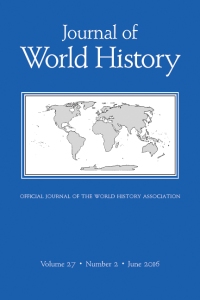
The Journal of World History publishes research into historical questions requiring the investigation of evidence on a global, comparative, cross-cultural, or transnational scale. Manuscripts must be submitted electronically via the new web portal (jwh.msubmit.net); emailed and mailed article submissions are no longer accepted. Please create an account at this web portal, login, and follow instructions.
Continue reading “Call for Papers: Journal of World History”
CFP: Journal of World History Special Issue on Gender and Empire
 Special Issue
Special Issue
Gender and Empire: Intimacies, Bodies, Detritus
The Journal of World History seeks submissions on the topic of Gender and Empire. For more than three decades scholars have incorporated gender studies
into traditional imperial histories to draw attention to the myriad ways in which imperial projects co-created modern gender identities. Emerging from scholarship on the major European empires of the 19th and 20th centuries (British, French, German, and Dutch), studies of gender and empire now include the United States, Russia, and Japan. Similarly, scholarship on colonized areas around the globe now includes Latin America, both postcolonial and neo-colonial, in addition to Africa and Asia. The range of research topics has also expanded considerably from literal intersections between gender and empire, as seen in policing prostitution and anti-miscegenation laws, to other less literal but no less body-saturated nanny/child relations; transnational foodways; and automobility to name a few. Regardless of foci, these approaches investigate formations of embodied race and gender identities as central to the ideology of imperialism as well as to the daily functioning of colonialism on the ground, with special attention to how the latter undercut the former. Continue reading “CFP: Journal of World History Special Issue on Gender and Empire”
Call for Papers to be published in Korean Studies
Korean Studies seeks to further scholarship on Korea by providing a forum for discourse on timely subjects, and addresses a variety of scholarly topics through interdisciplinary and multicultural articles, book reviews, and essays in the humanities and social sciences. All scholarly articles on Korea and the Korean community abroad are welcomed, including topics of interest to the specialist and non-specialist alike. The journal is invaluable for Korea specialists as well as those whose interests touch on Korea, the Korean community abroad, or Asian, ethnic, and comparative studies.
The journal publishes new research, review articles, and book reviews about various topics within the field of Korean Studies. All articles are printed in English, and all submissions must be in English following the submission guidelines available from the journal home page. All manuscripts should be submitted with text formatted in Times New Roman, 12-point font, single-spaced, with 1” margins, and pages numbered. Korean transliteration should conform to the McCune-Reischauer system, with the exception that the Yale romanization system may be used in linguistics articles. Original Asian characters may be included in parentheses (e.g., Korean, Chinese, Japanese) for words whose meanings may not be clear when translated into English. See previous issues for reference.
Submission Types: Korean Studies publishes regular research articles (10,000-word limit), news and viewpoint pieces (2,000-word limit), and book reviews (1,000-word limit). Research articles may present new research findings or review current debates in a specific field. News and viewpoint pieces may take the form of responses to previously published works, either in Korean Studies or another venue. However, note that original authors will have the opportunity to review response pieces and respond with formal replies. Once a manuscript is formally accepted each manuscript will proceed through copy-editing. Once copy-editing is completed every manuscript will be uploaded to the Advance Publication site as a paper formally “In Press” [with associated DOI (Digital Object Identifier)]. It is then downloadable and citable. Formal publication in an issue of the journal, including publication year, volume and page numbers, will occur when the editor has a sufficient number of papers to complete an issue. Once all papers are accepted for an issue the manuscripts are compiled and the production process is completed, at which time the issue will be published online and in print.
Please review the complete Submission Guidelines, available online. Article submissions should be sent to the Editor: Christopher Bae, Center for Korean Studies, University of Hawai‘i. email: cjbae@hawaii.edu Please send book review inquiries to the Book Review Editor: Ji Young Kim. email: jkim22@hawaii.edu
Pacific Science Call for Papers
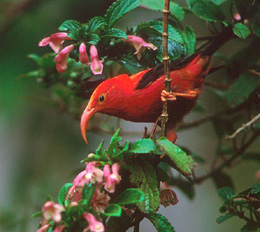
‘I’iwi on native mint in the Hakalau Forest National Wildlife Refuge.
Special Issue: Scaling up Restoration Efforts in the Pacific Regions
Pacific Science , a journal dedicated to biological and physical sciences, is calling for submissions to a special issue focusing on identifying challenges and solutions in the process of scaling up restoration efforts in the Pacific Islands. Continue reading “Pacific Science Call for Papers”





